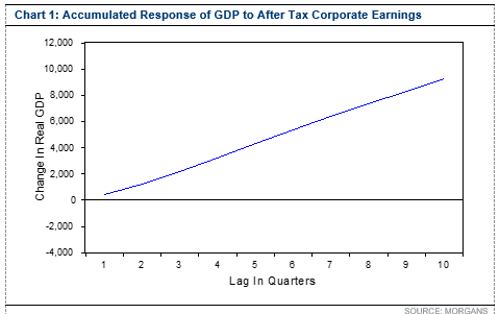The Coalition has promised to cut corporate taxes by 5% over the next ten years. Some economists have been very publicly unable to find the relationship between corporate tax cuts and growth in GDP. We thought we would look at the research that is available on this and provide our own conclusions on the matter.
The most widely discussed analysis is conducted by the Australian Treasury in support of the Business Tax Working Group. Chapter 1, section 44 of this report notes that a 1% cut in the company tax rate from 30% to 29% would increase the level of GDP by 0.2%.
The Coalition proposal is for the company tax rate to ultimately be cut from 30% to 25%, a 5% reduction. The Treasury modelling might then be extrapolated to conclude this 5% reduction might increase the level of GDP by about 1%.
Advertisement
We analyse how these changes may occur and then provide our own conclusions.
A Theoretical Examination
We think that profits lead retained earnings. Retained earnings then lead investment. Investment then leads employment. Retained earnings are affected by business costs. One of those costs is interest rates. Another of those costs is corporate taxes.
We are all familiar with the process by which interest rates lead investment and investment leads employment. We know that a cut in interest rates by the Reserve Bank is regularly and observably followed by our higher level of investment. We then know that that higher level of investment then leads to more employment.
The reason that a cut in interest rates leads to more investment is that a cut in interest rates means that a higher proportion of profits are left over to invest.

How does a cut in corporate tax stimulate the economy?
Advertisement
In Keynesian Economics, the Keynesian multiplier demonstrates how an increase in spending somewhere in the economy – whether it be in consumption or investment - stimulates further spending in other parts of the economy. Total spending and GDP can be increased by more than the original spending. Both investment spending and consumption spending can and usually would be stimulated, along with increased jobs in both the consumption and investment supply sectors.
This extra spending throughout the economy can be brought about by government changing its taxing and spending activities. The proposed cut to corporate tax represents just such a change. One part of the initial stimulus will be through increased retained earnings by companies leading to increased investment spending by those companies.
This initial extra spending will then lead to further extra spending by those companies providing the plant and equipment. There would be extra spending by their workforces, leading to additional income for the owners of those companies providing supplies. There would also be higher income for their employees, leading to higher consumption, further investment, further employment growth, further consumption, and so on, moving right through the economy.
The information contained in this report is provided to you by Morgans Financial Limited as general advice only, and is made without consideration of an individual’s relevant personal circumstances. Morgans Financial Limited ABN 49 010 669 726, its related bodies corporate, directors and officers, employees, authorised representatives and agents (“Morgans”) do not accept any liability for any loss or damage arising from or in connection with any action taken or not taken on the basis of information contained in this report, or for any errors or omissions contained within. It is recommended that any persons who wish to act upon this report consult with their Morgans investment adviser before doing so. Those acting upon such information without advice do so entirely at their own risk.
This report was prepared as private communication to clients of Morgans and is not intended for public circulation, publication or for use by any third party. The contents of this report may not be reproduced in whole or in part without the prior written consent of Morgans. While this report is based on information from sources which Morgans believes are reliable, its accuracy and completeness cannot be guaranteed. Any opinions expressed reflect Morgans judgement at this date and are subject to change. Morgans is under no obligation to provide revised assessments in the event of changed circumstances. This report does not constitute an offer or invitation to purchase any securities and should not be relied upon in connection with any contract or commitment whatsoever
Discuss in our Forums
See what other readers are saying about this article!
Click here to read & post comments.
5 posts so far.